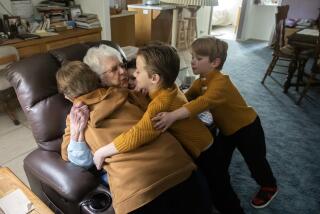SHUE Fits Retirees, Students
- Share via
When it comes to age, culture and language, the teachers and students in Westminster’s literacy program could not be more different.
But those barriers seem to dissolve when the two groups come together under Project SHUE, a 5-year-old program that unites white senior citizens and primarily minority children to share with and learn from each other.
Project SHUE, which stands for Safety, Health, Understanding and Education, was instrumental in Westminster’s winning the 1996 All-America City Award earlier this year. Judges cited the program as a key part of the award, which recognizes cities for dealing successfully with problems such as racial and ethnic discord.
The program “was a big factor in helping us win,” Mayor Charles V. Smith said.
The judges were impressed by several aspects of the program, said city officials who traveled to Fort Worth for the awards ceremony.
Foremost was the intercultural and intergenerational exchange that takes place five days a week for a few hours after school at the Westminster Senior Center.
Also, the program is a relatively low-cost supplement to schooling for the children and a community-service opportunity for the seniors, some of whom are paid a small stipend for their work.
“It’s a very positive way for the cultures to work together,” said Betty Goyne, who founded Project SHUE in 1991. Goyne said she derived the name from the nursery rhyme about the old woman who lived in a shoe and “had so many children she didn’t know what to do.”
Goyne’s goal was to help “latchkey” children as well as provide extra income and activities for retirees. It is funded through private donations and federal community development block grants.
The program, which has grown to serve 50 children, is so popular that Goyne is raising money to open a second Project SHUE at the Westminster Boys and Girls Club. With about $20,000 toward her goal of $35,000, Goyne said, she hopes to have the funding in place this month.
“We’re going to call them the left SHUE and the right SHUE,” Goyne quipped.
Local educators said they have seen the positive effects from the program in their classrooms.
“It helps the children’s self-esteem to know that they’re going to a place were people are there to help them and care about them,” said Gail Borowick, principal of H.B. Anderson Elementary School.
“It helps them academically because it gives them an opportunity to work with someone on a daily basis, to help with homework or problems or just to be there for them,” Borowick said. “We think of the seniors and children as being different, but really they have a lot in common. They have a lot to share with each other.”
More to Read
Sign up for Essential California
The most important California stories and recommendations in your inbox every morning.
You may occasionally receive promotional content from the Los Angeles Times.













